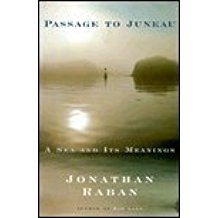Passage to Juneau: A Sea and its Meanings, Jonathan Raban, 1999
Raban, a Brit transplanted to Seattle, takes his 37 foot boat from Seattle to Juneau along the Inner Passage experiencing personal loss as well as individual achievement. He interweaves his story of navigating the archipelagos and seas of British Columbia and Alaska with that of 37 year old George Vancouver who captained H.M.S. Discovery and her sister ship Chatham in 1792 on its voyage of mapping the coast and searching for the Northwest Passage. The native Indian tribes of those coasts are another theme as is Raban’s father’s death in England, the occasion for a family reunion of the four brothers and an opportunity to review his relationship with his father, an Anglican clergyman who moved from right to left politically and religiously. Raban’s relationship with his 3 year old daughter Julia and his wife Jean who asks for a separation upon joining him in Juneau is another thread of this wonderfully written book which combines the best elements of nature, anthropology, sailing and fishing, oceanography, history, geography, and sociology. Only an author with Raban’s skills and sensitivity could pull this one off. Read this book with Google Maps handy. Raban quoting Shelley quoting Goethe regarding the passing moment, “Remain, thou art so beautiful.” Raban on the gathering of family and friends for his father’s funeral—“How old we all were—the children of the 1950s—with our crow’s –feet, bifocals, paunches, jowls, bald heads, gray hair, varicose veins, turkey-wattles, back problems, cancer scares, hearing defects, and all the ills that came with second homes, stock portfolios, Volvos, time-shares in Tuscany, modest gongs and titles, and already a liberal sprinkling of grandchildren.” Finally, Raban on memory, “Memory always has its own dark purpose, often hidden from the rememberer; and it is a ruthless editor, with a facile knack for supplying corroborative detail.”



